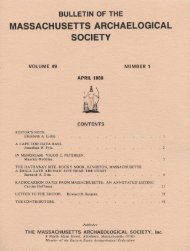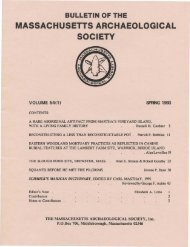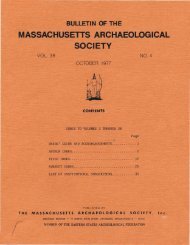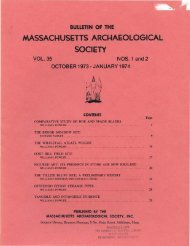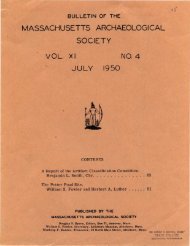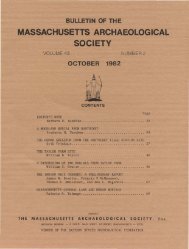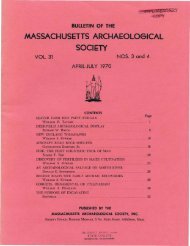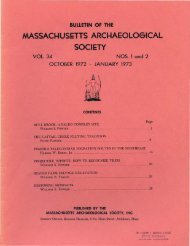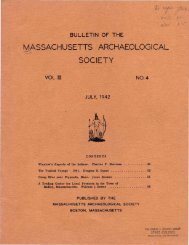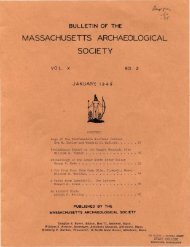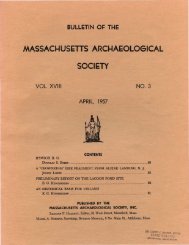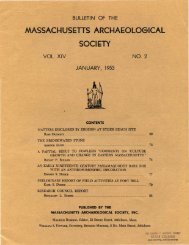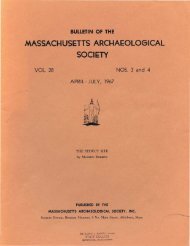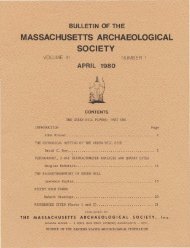No. 2 – October 1990
No. 2 – October 1990
No. 2 – October 1990
Create successful ePaper yourself
Turn your PDF publications into a flip-book with our unique Google optimized e-Paper software.
VOLUME 51. NUMBER 2 89<br />
their roots in the peculiar nature of our archaeological preservation system. How, then, are<br />
we to improve? One importa:-.t pl:lycr here, perhaps the most important, is the State Historic<br />
Preservation Office (SHPO). which reviews the contract archaeology reports. The SHPO<br />
must take the lead in setting standards and demanding high quality work. Only it can provide<br />
the checks and balances needed to offset the realities of low-budget archaeology.<br />
Unfortunately, in an era, of budgetary and personnel restraints, the SHPO may not have<br />
sufficient resources to effectively police the profession. Ultimately, contract archaeologists<br />
themselves must improve or we will continue to be our own worst enemies in developing the<br />
field as a profession.<br />
At the beginning of my talk I referred to some of the "larger" issues that contract<br />
archaeologists must address. I only have time to briefly mention a few of these. One is the<br />
status of casual employees - the field and lab crew who are hired, without benefits, to work<br />
from project to project until they are laid off when the work runs out or the winter sets in.<br />
These people are the core of our trade, and yet they are the archaeological equivalent of<br />
migratory farm workers. We must do something about this situation.<br />
My other points concern the relationship of contract archaeology and archaeology in<br />
general; and here, I believe that organizations such as the Massachusetts Archaeological<br />
Society must also address these issues, and can indeed play an important, perhaps the leading,<br />
role. We need to find ways to deal with the problem of archaeological site preservation on<br />
private land. We should support the State Historic Preservation Office and legislative<br />
initiatives that would require surveys for private development projects, and we should also<br />
promote creative methods of preservation, for example through preservation easements and<br />
restrictions.<br />
We need to be more vocal as public spokespersons for archaeology and cultural<br />
preservation. We must counteract the Indiana Jones image of archaeology as treasure hunting,<br />
and get people interested in their own cultural heritage. We must represent the truth against<br />
the fringe groups who distort reality and clutter the public's perception of archaeology with<br />
fantasies about Celtic megaliths and cultural diffusion from outer space. And finally, we<br />
need to do something about the underwater salvors who pose as historians and archaeologists<br />
as they commercially mine our underwater archaeological resources. As archaeologists, we<br />
should not collaborate with them, and thereby validate their activities. And we must act to<br />
change the now archaic Massachusetts Underwater Archaeology Act of 1973 and take away<br />
the financial incentives from the salvors.<br />
REFERENCES<br />
Dincauze, D.F., H.M Wobst, R. Hasenstab, and D. Lacy<br />
1981 Retrospective Assessment of Archaeological Survey Contracts in Massachusetts.<br />
1970-1979, 3 vols. Report prepared for Massachusetts Historical Commission, Boston.'<br />
Hester, James J.<br />
1987 "Archaeology on the Cheap." In Rescue Archaeology: Proceedings of the Second New<br />
World Conference on Rescue Archaeology, edited by R. L. Wilson, pp. 193-200.<br />
Southern Methodist University Press.



